In some cities, like in Cairo, I’ve felt that there are so many places to visit and document that there’s no possible amount of lifetimes that could be used. But this past weekend in Cairo, I decided to take a page out of Benjamin Orbach’s book, “Live from Jordan,” and make sure that I’m making use of my time in the Arab East to reconnect to the people and culture itself, instead of just the worn bricks and carvings that have often formed a basis of my travels. They’ve been around for hundreds if not thousands of years; I have time to see them. The days of my stay in the Arab world, however, are dwindling, slowly but surely.
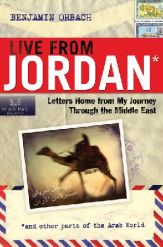 The book I’m describing was written in 2002 by an aspiring young American Jew, during the uncertain times between September 11th and the beginning of the Iraq war. My parents got it for me for Christmas, and I started reading it after finishing “Three Cups of Tea” while I was in Europe. I finished it while in Nazareth, and it definitely will be on my list of books to recommend for anyone who’s interested in viewing this most varied of Arab countries. Ben Orbach stayed for almost a year in Jordan, although it was cut short by the embassy’s request in March 2003 that all American civilians get the heck out of Dodge because of the start of the war. I got a chuckle out of every chapter in his book, mostly because I could nod my head and say, “brother I’ve been there and you’re preaching to the choir.” However, as Orbach was here in Jordan to study Arabic formally and on a research grant, the other half of his chapters, which are written in a format of letters back home to his family and friends, are packed with useful insights on culture, the separation I’ve oft-noticed between the “club life” of West Amman and the “sell you a chicken through your car window” of East Amman (it’s happened to me before). He has some especially good thoughts on the Palestine/Israel conflict, made all the more poignant because of his religion, upbringing, and family living in Israel. Lastly for me, it’s a jaw-dropping moment to realize that in the space of seven years since he wrote these letters home, prices for most common services and goods have doubled in price. Now that I’ve finished it, I’m going to be leaving my copy here in this apartment in Jordan, in the hopes that whatever foreigner (and Philip, God willing) that follows me will enjoy it just as much and for similar reasons. Here it is on Amazon.
The book I’m describing was written in 2002 by an aspiring young American Jew, during the uncertain times between September 11th and the beginning of the Iraq war. My parents got it for me for Christmas, and I started reading it after finishing “Three Cups of Tea” while I was in Europe. I finished it while in Nazareth, and it definitely will be on my list of books to recommend for anyone who’s interested in viewing this most varied of Arab countries. Ben Orbach stayed for almost a year in Jordan, although it was cut short by the embassy’s request in March 2003 that all American civilians get the heck out of Dodge because of the start of the war. I got a chuckle out of every chapter in his book, mostly because I could nod my head and say, “brother I’ve been there and you’re preaching to the choir.” However, as Orbach was here in Jordan to study Arabic formally and on a research grant, the other half of his chapters, which are written in a format of letters back home to his family and friends, are packed with useful insights on culture, the separation I’ve oft-noticed between the “club life” of West Amman and the “sell you a chicken through your car window” of East Amman (it’s happened to me before). He has some especially good thoughts on the Palestine/Israel conflict, made all the more poignant because of his religion, upbringing, and family living in Israel. Lastly for me, it’s a jaw-dropping moment to realize that in the space of seven years since he wrote these letters home, prices for most common services and goods have doubled in price. Now that I’ve finished it, I’m going to be leaving my copy here in this apartment in Jordan, in the hopes that whatever foreigner (and Philip, God willing) that follows me will enjoy it just as much and for similar reasons. Here it is on Amazon.
When I left on the “Trust Bus” early on Saturday morning, I paid 30 dinars for a one-way ticket to Nazareth, which seemed like a good deal to not have to deal with negotiating other transport once crossing over the Sheikh Hussein river border in the north. I was the only passenger on the bus for three hours; only me, the driver, and the luscious air conditioning. I didn’t know yet that Amman was about to be suffering the worst heat wave of the year at 41 degrees – but I’d be enjoying downright chilly climates at 38 degrees instead, ha ha! At the Jordan side of the border, the bus was loaded up with another dozen Arab travelers and I discovered that this wasn’t just a tourist transport, it was the actual ‘general transport’ bus for people waiting to cross the border.
With more people to entertain than a single drowsy foreigner, the driver switched on Arabic dance music and the mood turned downright festive. Teenage Arab girls in typical western capris and t-shirts splashed duty-free perfume on each other, and four plump middle-aged women in the full conservative black dresses and head scarves took turns yelling “Ohguhd. OHGUHD YALLA!!!” futilely at their hyperactive young children, trying to get to them to sit down. The Jordan River was much wider up here, closer to the Sea of Galilee that is its main source of water. When I saw it last year at the King Hussein border crossing, and at Jesus’ baptismal site even farther south, there was basically no water to speak of in the ditch that used to be a river.
Once over, our bus sat and idled in the shade for another 40 minutes before a bored-looking Israeli woman wandered over, shined under the bus for anything explosive with a long mirror, and waved us over before returning to stand in the shade. The customs and scanning procedure for me was the same as last time – I was immediately singled out for being the only Caucasian on the bus, brought to the head of the line, and then questioned as to my purpose in Israel, purpose in Jordan, what all these weird Central Asian visas in my passport were, and my father and grandfather’s name. I was tempted to add, “and my great-grandfather’s name was Ali bin Saddam bin Usama” but managed to restrain myself. The process took about fifteen minutes for me; longer than it had taken with my parents last time. I guess a single young male traveler coming through the “irregular” northern border was grounds for suspicion.
On the other side of the fence outside, I found the second transport system that the bus driver had arranged for me, an elderly Arab Christian man from Nazareth named Abu Hattem. He didn’t speak English, but was joined by his droop-mustached and dry-humored friend Riyath, a Muslim Nazarene. The former was generally quiet and easygoing, but Riyath introduced himself to me in English by saying, “You’re American? The Arabs in Israel don’t like Americans; you won’t find any that do. Not here or anywhere else. Not after what they’ve done.” I chose not to disagree with him from my own experience but explained my work in Jordan to him and Abu Hattem, who smiled encouragingly at me in the rear-view mirror. As we talked, Riyath seemed to warm to me and admitted that like most Arabs, it was our government that he disliked but he had no problem with Americans who wanted peace and justice for the Arab people.
When I asked the two of them what their religions were (not considered a rude question in the Arab world; I’m constantly asked it all the time), Abu Hattem quickly responded that he was a Christian, but Riyath seemed to take offense and instead told me to ask whether someone was Arab or Israeli and whether they wanted peace for all people or only for some. He seemed to get wistful for a moment, then as we pulled into Nazareth’s crowded city market, he looked back at me over the seat and said, “Zakariya, you must remember that for us, Israel is our father and Palestine is our mother. They are all we know and they are both in our blood now. This is not the West Bank or Gaza. I love both my father and my mother. What else can I do? But I wish that my father took better care of all his children.”
I was left standing there at the base of the famous Catholic basilica, not entirely sure where to go next. Thankfully, as I was wandering through the market, avoiding being sold anything (I only had my backpack with me; no room to really take anything back to Jordan), I overheard a family chatting nearby in Arabic that sounded touristic in nature. I asked them if they knew where the Fouzi Azar Inn was, and the adult woman in the group said to me in flawless English, “Where are you from? We’re from Canada, but Nazareth is my hometown. I’m Ieeyan.” She introduced her kids, niece and nephew to me and told me it was great to see another North American traveler visiting the less-traveled parts of Israel.
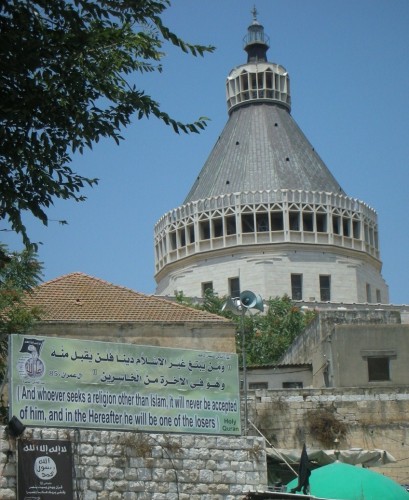
This is the first sign I saw after stepping off the bus near the towering basilica. From what I'm told, it used to be 70% Christian, 30% Muslim in Nazareth but now those numbers have been reversed and the Muslims are making a strong effort towards further conversions
With Ieeyan’s advice (and her Nazareth-smart knowledge that it was Azar with an aiyn letter, not an A-sounding letter) I was able to easily find the hostel, get checked in, and get a desperately needed shower. Interestingly enough, I ran into Ieeyan’s clan again just an hour later at the Orthodox Church of St Gabriel, just a few blocks away from the hostel, where they were debating sampling the holy water from the spring that by Orthodox legend, Mary was drawing water from when she first heard the angel speak to her to give her the Good News. Before the Orthodox bishop kicked us all out for Saturday mass, I had a chance to sample the water, collected for sampling purposes near the door. Lukewarm and not very appetizing for sure; I guess it’s the spiritual thought that counts.
As we exited the church, squeezing past a couple bearded and droning priests swinging incense, Ieeyan asked what I’d seen so far in the city, and recommended that I see the Salizian Hill on the western side of the city, to get a view out over the city. In fact, why don’t you just join us; my niece and nephew still live here in Nazareth and we’re taking their car up there now; we can fit you if we squeeze, she suggested. So, that’s how I ended up squeezing into the front of their tiny hatchback and being taken up the narrow streets of Nazareth in grand tourist style, up to the top of the hill, where we could see all the way across the valley into the nearby town of Natserat Illit, which was easy to pick out from the several skyscrapers and shining towers of glass. “That’s where all the Jews choose to live,” one of the kids said, gazing across the two-kilometer span between the hills to the other city. “The Arabs stay where they’ve always stayed in their old homes in Nazareth.” They explained to me that although it was an ironic coincidence, “Illit” is pronounced like “Elite” in English but in Hebrew merely means geographically higher, as opposed to higher status. I mused out loud whether it was intended to have the double meaning in English and Hebrew, and there was a wry chuckle of knowing agreement from the group.
As it was Saturday, the Jewish holy day, shops were closing up early and as the sun went down, there wasn’t too much available to do in the city. I went back to the hostel and napped in the dorm room bed I had acquired a few hours earlier, enjoying the cool stone around me. The Inn is named after its last male owner, Mister Fouzi Azar, who died in 1980. The Azar family used to be quite wealthy before 1948, when most of their vast land holdings in the area were liberated from Arab possession by the new Israeli government. Fouzi later could have gone to court over it to ask for recompense (it wasn’t offered up at the time) but ended up being too proud to accept any money for it and refused to say that he had “sold” his land to anyone. After his death the Azar house fell into disrepair for fifteen years, until an Israeli hiker, Maoz Inon, asked Fouzi’s five daughters and grandchildren for permission to turn it into a hostel, which they gave on the condition that it would bear their father’s name, because there had been no male heirs for the Azar name and it had died out with Fouzi. It was a neat story, related to me and some other spellbound tourists in the sunny main sitting room by Fouzi’s granddaughter, who now acts as the day manager for the hostel. Maoz Inon was also there too, and he and the Arabs chatted together in cheerful English about how things were going and doing some cleanup procedures together. If only the West – and Jordan! – could hear more about such amazing stories of benevolent cooperation between Israelis and Palestinians like this to create new businesses like this.
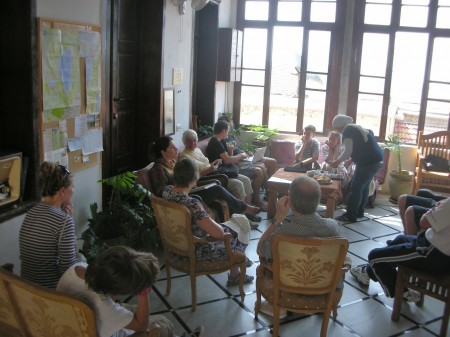
Suraida Nasser, Fouzi Azar's granddaughter (back to wall, closest to picture) tells her family history to guests
I didn’t nap through straight to the next morning, but got up and wandered a bit around the lively borders between the Old and New cities with a New Zealand tourist that was also staying in the hostel. I taught him a little Arabic and we sampled the incredibly delicious and expensive Palestinian schwarmas being sold on the street corners. In Jordan, a little schwarma-wrap sandwich is usually about the equivalent of 84 USD cents, and is 2 centimeters in diameter. In Arab communities here though, they are massive, meat-stuffed spheres the size of my two fists balled together and you can choose a variety of delicious toppings to put on them, like onions with sumac powder, cabbages, red beets, olives, pickles, tahini sauce, and even some stalls will have a zingy mango chutney sauce. Of course, they’re also about eight times more expensive, but I made sure to eat at least one per day. I wish I could find a shop that sold schwarma like that here in Jordan, but I guess it’s just one of those things that will stay on the other side of the river. I wondered the same thing after I came back from Egypt in regards to koshri, and I’ve heard there’s one restaurant on Gardens Street that sells it, but I have yet to find this mythical place.
The most famous and eye-catching structure on the Nazareth skyline is the Basilica of the Annunciation. Like so many things in the Holy Land’s religious armada, there are two of them. I had visited the Orthodox Church’s small church the previous day, but the Catholic church is obviously the more well-known of the two. I was taken on a tour of the old city that morning by Julian, an American volunteer who’d been living in Nazareth for a month, working at the hostel and giving tours. In fact, with the exception of Suraida and a few others, almost the entire staff of the Fouzi Azar is volunteers. He pointed out the dozens of internationally-donated mosaics and artwork from countries all over the world. Notably absent were any other Arab countries, but the USA had one of the largest donations, a three meter tall fresco of a steel-wrapped Madonna in a solar wreath of light and fire. Because it was Sunday, there were Arab church services going on in both locations, and although we were able to stand in the back of the huge basilica hall (seriously; it was like one of those southern American mega-churches, except attractively designed) when we came to the door of the Orthodox church, we were shooed out by a priest. The basilica actually had two layers; one for the church and another for the “grotto” where the Catholics believe Mary’s home was.
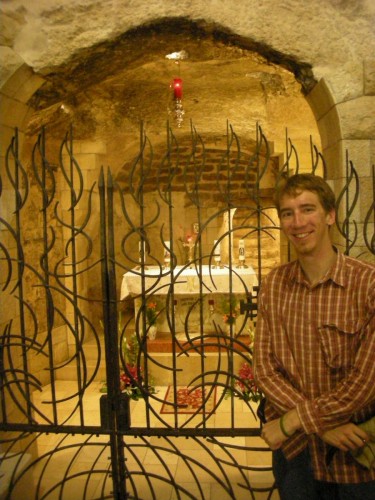
Julian snapped this shot in the dim sunken chamber housing the shrine of Mary's grotto. Directly above us was an opening in the ceiling from which we could hear the hymns clearly.
After Julian finished the tour, he returned to the hostel and I prepared to take a trip to the north and visit Lake Tiberius, better known in the west as the Sea of Galilee. The hostel had a list of bus routes and times, and although I thought I was sitting in the right place, I was worried because all of the times and locations were written in Hebrew, which everyone seems to be able to read except for me.
The bus stop I sat in was across the street from the Orthodox church, and when I entered the only other waiter was an elderly Arab man wearing a ski cap and a faded blue dress suit who pantomimed asking for a cigarette. I sat down at another bench, and he got up and walked shyly towards me. “My name is Saleem. Everybody love me,” he muttered. And then again. And again. I nodded politely and agreed with him that yes, I’m sure everyone did love him. A young Middle Eastern woman with long curly black hair sat down on the other side of me and watched this exchange with some curiosity. Saleem returned to his original position and muttered quietly to himself. I watched the traffic honking and waving to Saleem. “Ya Abu Beeb!” several of them cried. “Yalla ya Abu Beeb!” called young men in a car with a blaring stereo. A lot of drivers of both cars and buses greeted him in some way, and he returned each one with a wave and murmured “Ahlan, ahlan,” which means “welcome.”
It was obvious that Saleem/Abu Beeb wasn’t going to be entirely helpful in determining bus schedules; he asked me where I was staying and I told him “Fouzi Azar’s house,” and he stared off into space and commented that he hadn’t seen Fouzi in a long time; and where had he gone? When the girl next to me took a phone call and chatted with a friend in Arabic, I took a chance and asked her in English if she knew about the bus schedule. She stared at me, wide-eyed, and said she didn’t speak English. I wasn’t sure if she was trying to get rid of me, but I figured she couldn’t be too conservative if she didn’t have a headscarf and had sat down next to a foreign man. In any case, she was talking to the wrong foreigner if she was trying to dissuade me from talking to her, because of course I then asked her the same question in Arabic.
The woman turned out to be quite helpful in fact. She said the schedule to the city of Tiberius wasn’t written, but she took the time to call a friend to see if she knew, and told me that it would be coming in twenty minutes. We chatted, and she told me her name was Tarneem, an Arabic word that means “hymn” and usually implies Christianity. When she asked me what my religion was, I took it as an opportunity to ask her the same. “I used to be Christian, but I converted to Islam a few years ago,” she replied. I was surprised, but didn’t press the issue further and she said that she was happy with the choice. “It didn’t use to matter what you were,” she commented. “The Israelis building Illit up there makes everyone’s tensions higher.” Before my bus came, she left me with a last wry joke. “You see how the Star of David for Israel is made of two triangles together. The triangle pointing upwards is for the Jews, and the one falling downwards is for the rest of us.”
On the hour-long bus ride to Tiberius, the only other people on the bus before me were two women, one from Taiwan and one from America. The American introduced herself as Lillian and joked with me that she recognized me as a Midwestern person right away by my accent. A classical Hebrew teacher back in the states, Lillian was a very interesting Jewish woman for me to talk to. I learned a lot about Israel and Judaism through her and the questions that she had about it to, picked up during her month-long visit to family. It was great to find someone so open-minded towards Arab and Israeli communication, and she was even talking about trying to find future ways to visit the West Bank area to see it for herself. Even though she told me, “I’m probably one of the worst people to ask about Judaism!” I found her to be quite educated; asking a fellow tourist and information-hunter is always one of the best conversations you can have.
I only had a few hours in Tiberius, and I was lucky to have Lillian because almost everything was solely in Hebrew; there was no English or Arabic written anywhere that I could see except some safety signs in English near the sea. We jumped a fence near a burnt-out ruin of an old mosque, and we were on the rocky beach of the Sea of Galilee. I was still badly burned from my bike ride on Friday, and hadn’t brought my swimming trunks with me. The two of us rolled up our jeans and waded out knee-deep into the water, as silvery-brown little fish flitted away from our feet into the darker shadows of larger rocks, just out of reach.
Then they came back and started sucking on our toes. It was amusing.
I wish I could have chatted for longer about politics and religion with Lillian, but it was rapidly getting dark and the last bus was leaving in only a half hour. We grabbed an Israeli beer at a “deck pub” sticking out into the sea, and then I literally had to sprint, stomach sloshing slightly, back in the general direction of the bus stop, keeping my eyes open for the familiar green-colored Egged buses. I made it back with only seconds to spare before the driver pulled out, and I thanked him in Arabic, and then in Hebrew for good measure just in case, thanks to a few key words that Lillian had shared with me.
And that was supposed to be the end of my last full day on the other side of the river. But it wasn’t. Abu Hattem, my original driver from Saturday morning, had told me that he’d take me back to Jordan on Monday afternoon for 180 shekels, or about 33 dinar. However, thanks to the hostel and a travel guide I’d met, I discovered that there was a national bus leaving every morning at 8:30, for the cost of 75 shekels. So, instead of leaving on Monday like I had planned, I paid 70 shekels for a third night at the Fouzi, canceled my ride back with Abu Hattem, and made a reservation for 75 shekels for Tuesday morning. I ended up saving 35 shekels, too.
As I mentioned at the beginning of this article, I wasn’t entirely sure what I was going to do with my extra full day in the city. Some of my coworkers at Whitman had recommended the “Nazareth Village,” exhibit near the south end of the old city, so I thought I’d walk over and give that a look. The village is a modern reproduction of what esteemed archeologists think 1st century Nazareth may have looked, and the land was donated by the hospital up the hill. They didn’t think there was anything special about this particular hill, but after they started digging they were reminded that in the Holy Land, everything is built on something when they dug into a thousand-year-old terrace system for a vineyard. That’s where our guide started our little group off, showing off a cross-section of rocks and soil depicting how the ancient Israelites used buried limestone “steps” to guide irrigation water down to each lower step so that none was wasted, a method that Palestinian farmers had also been using for centuries. People don’t realize how these agrarian peoples like Palestinians were connected to the land that was taken from them; after a family sets up a hugely complicated network of buried irrigation channels, covers them with soil, just being told “Okay, just go somewhere else to farm; no big deal,” is just about the worse thing imaginable.
I noticed that our guide seemed to be speaking in fluent Arabic to the various older actors working the looms, carpentry shop, and fields, and that he had a small wooden crucifix swinging from his neck. I was surprised he was speaking Arabic, because in his cargo shorts, t-shirt, and crew cut, I figured he was another American volunteer like at the Fouzi Azar Inn. As everyone else trooped out of the weaving building, I paused and asked the elderly woman at the loom whether our guide was an Arab. Oh yes, of course, she answered. His name is Majad (which means glory). He’s Christian then? I asked, pointing at my own crucifix on my neck. The old lady smiled as she worked, glancing up at me. “Sweetie,” she said to me Arabic, “all of the people at this village are Christians. Hurry and catch the group and Jesus be with you.”
I had a chance to chat with Majad after the tour; he took me out to see the tomb exhibit that I had missed seeing before. He explained that he’d been going to school at university in Arizona for several years and had a lot of family in America, which explained his almost complete lack of recognizable accent. As an Orthodox, he was curious about some Lutheran traditions, which I explained to him as we stood in the shade of a large oak tree shading the small cave door of the faux tomb. It’s interesting; it seems that no matter what, I end up engaging every person I’ve met in Palestine/Israel in a religion discussion, whether I meant to or not!
That evening, Julian took myself and some of the other newer volunteers out on a hike out to the city limits, for the purpose of showing the route of the Jesus Trail to the other volunteers so that they in turn could assist tourists with the hike, which begins in Nazareth. The Jesus Trail is another project of the aforementioned Maoz Inon who created the Fouzi hostel, and there’s a lot of crossover between hostel guests and trail hikers. I had a chance to check out the website and some of the large, detailed maps of it they had pinned to a wall in the hostel; it looks and sounds like a beautiful way to spend four days hiking through the north wilderness and retracing some of Jesus’ best known visits around his homeland.
The three other people that went out were a Jewish girl visiting Israel on the Birthright tour, a tall and lanky Dutch guy with a lot of tattoos, and a friendly Mexican girl that had checked me into the hostel on Saturday afternoon. Because of her darker skin and hair, combined with my tiredness, I had figured that she was an Arab and repeatedly tried to speak with her in Arabic to be polite while she was showing me around the hostel. It wasn’t until hours later that I discovered that we were from the same continent and she had no idea what I was saying, just nodding politely. Maybe she thought I was an Arab. Anyway, the five of us clambered up the 400 stairs that lead up the Salizian Hill just behind the hostel, with me doing my best to not ask too many questions of my Nazareth-savvy companions and just enjoy their conversation and the cool ambiance of the early evening.
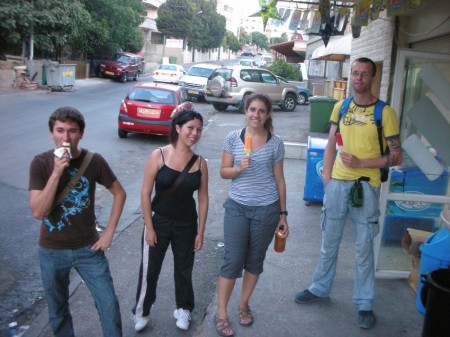
We stopped for 1-shekel popsicles at the top of the hill, which in the heat and humidity, seemed to end up more on my hands and face than anything else
It took about forty-five minutes for us to reach the edge of the city, and the same to return. As we descended back down the hill the way we had come, dogs barked at us from inside the jumbled houses piled on top of each other on the hill, and I could hear the sound of children playing in the darkness behind the walls and the sound of old men talking and most likely smoking argeilleh or playing cards. In the darkness, we all needed to be careful to watch our footing on the steps and not step into the half-meter wide gash running down a lot of the stairs, where a century ago donkeys had been walking up and down this hill carrying heavy bags of goods.
After we returned, I watched a movie with my hostel friends before calling it a night around midnight. I was quite drowsy when I stumbled up out of the Old City the next morning at 7:45, but thankfully I had scouted out the bus station after leaving the Nazareth Village yesterday and the traffic wasn’t so bad that early in the morning. I had coordinated my last few shekels perfectly, down to my tenth of a shekel coins (about 3 cents USD) to be able to pay for the bus, and the Israeli exit tax. The ticket office refused to take my small shekel coins though and only wanted banknotes instead. The bespectacled little man flatly handed them back to me, explaining that he didn’t like them, and then reached into a drawer and dumped another handful of small change into my hands. “Give that to the border guards; they’ll have a use for it I imagine.”
It’s probably a good thing he gave me that change because an hour and a half later, I stood incredulously in front of a smirking twerp who had just told me that it would be another 4.5 shekels to leave Israel. “I just checked the government website yesterday!” I protested. “It says it’s 94 shekels for the exit tax, not 98.5!” The extra is for our commission, he smiled at me. “What commission,” I growled; “there’s a sign over your desk right in front of me that says in big green letters, ‘no commission’.” His smile seemed to get wider. “Well, now we take a commission.” So much for my shekel-perfect planning, even with the extra ~2 shekels from the ticket seller. I was about to tell this guy where he could insert his extra shekels when a young German guy next to me in line nudged me and said “Here man, take these extras I have.” Thank goodness for his random kindness; otherwise I would have had needed to pay with my credit card and I’d have 96 worthless shekels still with me now back in Jordan. But sometimes, it’s not about the places you’re visiting – it’s about the people – Israeli, Arab, and everyone else I met this weekend. It was a great trip, and I learned a lot – definitely more than I thought I would and from many different sources! It’s the kind of trip that I think Benjamin Orbach would be proud of.
One final note: I didn’t find much information about it on the internet (possibly because of their horrible, flash-based website that couldn’t be searched by Google properly) but if you’re in Jordan and want to take advantage of the lowest priced round-trip ride to Nazareth and back, it’s only 30 JD with Nazarene Tours. I got the business card of the contact on the Jordanian Side, it’s Ahmad al-Musri and you can reach him at +962-79-692-7455.
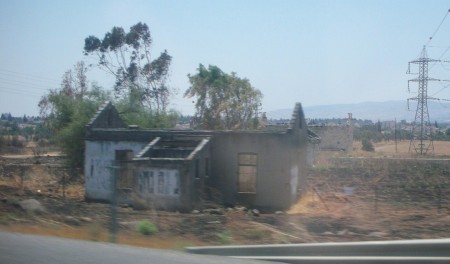
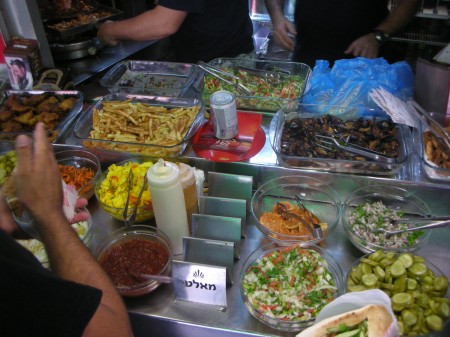


It sounds amazing. I probably would’ve cried when the border guy asked for his .
You went back the next day and went to Bethlehem village? So did I! We must have just missed each other 🙁
Oh well, fate is a fickle thing 😉